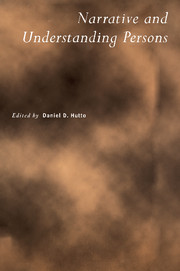Book contents
- Frontmatter
- Contents
- List of Contributors
- Notes on Contributors
- Narrative and Understanding Persons
- Framing Narratives
- The Narrative Practice Hypothesis: Origins and Applications of Folk Psychology
- Dramatic Irony, Narrative, and the External Perspective
- Episodic Ethics
- On the Distance between Literary Narratives and Real-Life Narratives
- Reasons to be Fearful: Strawson, Death and Narrative
- Stories, Lives, and Basic Survival: A Refinement and Defense of the Narrative View
- Self and Other: The Limits of Narrative Understanding
- Pathologies in Narrative Structures
Self and Other: The Limits of Narrative Understanding
Published online by Cambridge University Press: 04 May 2010
- Frontmatter
- Contents
- List of Contributors
- Notes on Contributors
- Narrative and Understanding Persons
- Framing Narratives
- The Narrative Practice Hypothesis: Origins and Applications of Folk Psychology
- Dramatic Irony, Narrative, and the External Perspective
- Episodic Ethics
- On the Distance between Literary Narratives and Real-Life Narratives
- Reasons to be Fearful: Strawson, Death and Narrative
- Stories, Lives, and Basic Survival: A Refinement and Defense of the Narrative View
- Self and Other: The Limits of Narrative Understanding
- Pathologies in Narrative Structures
Summary
If the self—as a popular view has it—is a narrative construction, if it arises out of discursive practices, it is reasonable to assume that the best possible avenue to self-understanding will be provided by those very narratives. If I want to know what it means to be a self, I should look closely at the stories that I and others tell about myself, since these stories constitute who I am. In the following I wish to question this train of thought. I will argue that we need to operate with a more primitive and fundamental notion of self; a notion of self that cannot be captured in terms of narrative structures. In a parallel move, I will argue that there is a crucial dimension of what it means to be other that is equally missed by the narrative approach. I will consequently defend the view that there are limits to the kind of understanding of self and others that narratives can provide.
The narrative account of self
Let me start out by presenting the narrative account of the self in some detail. A central starting point is the assumption that we need to distinguish between merely being conscious or sentient, and being a self. The requirements that must be met in order to qualify for the latter are higher. More precisely, being a self is an achievement rather than a given. How is selfhood achieved? In and through narrative self-interpretation.
- Type
- Chapter
- Information
- Narrative and Understanding Persons , pp. 179 - 202Publisher: Cambridge University PressPrint publication year: 2007
- 35
- Cited by

